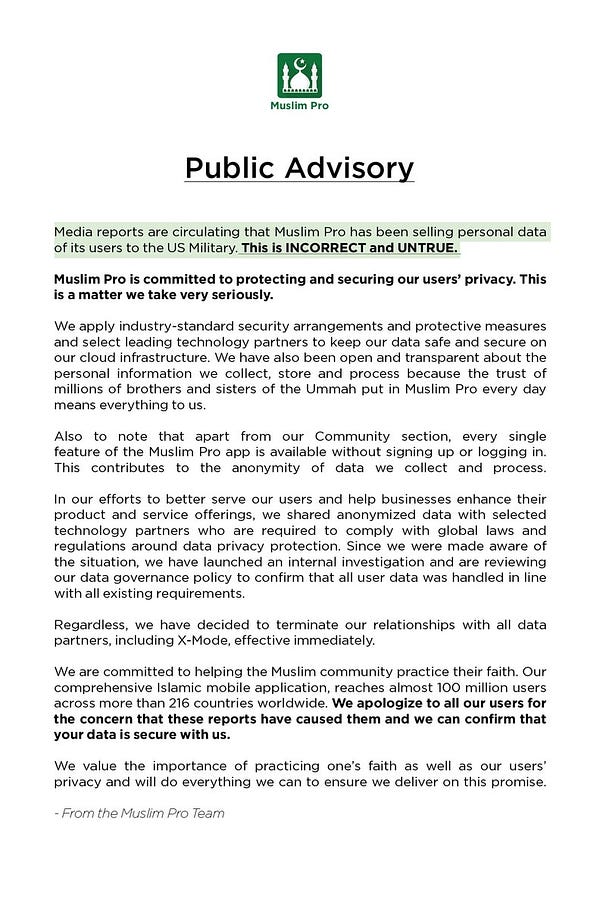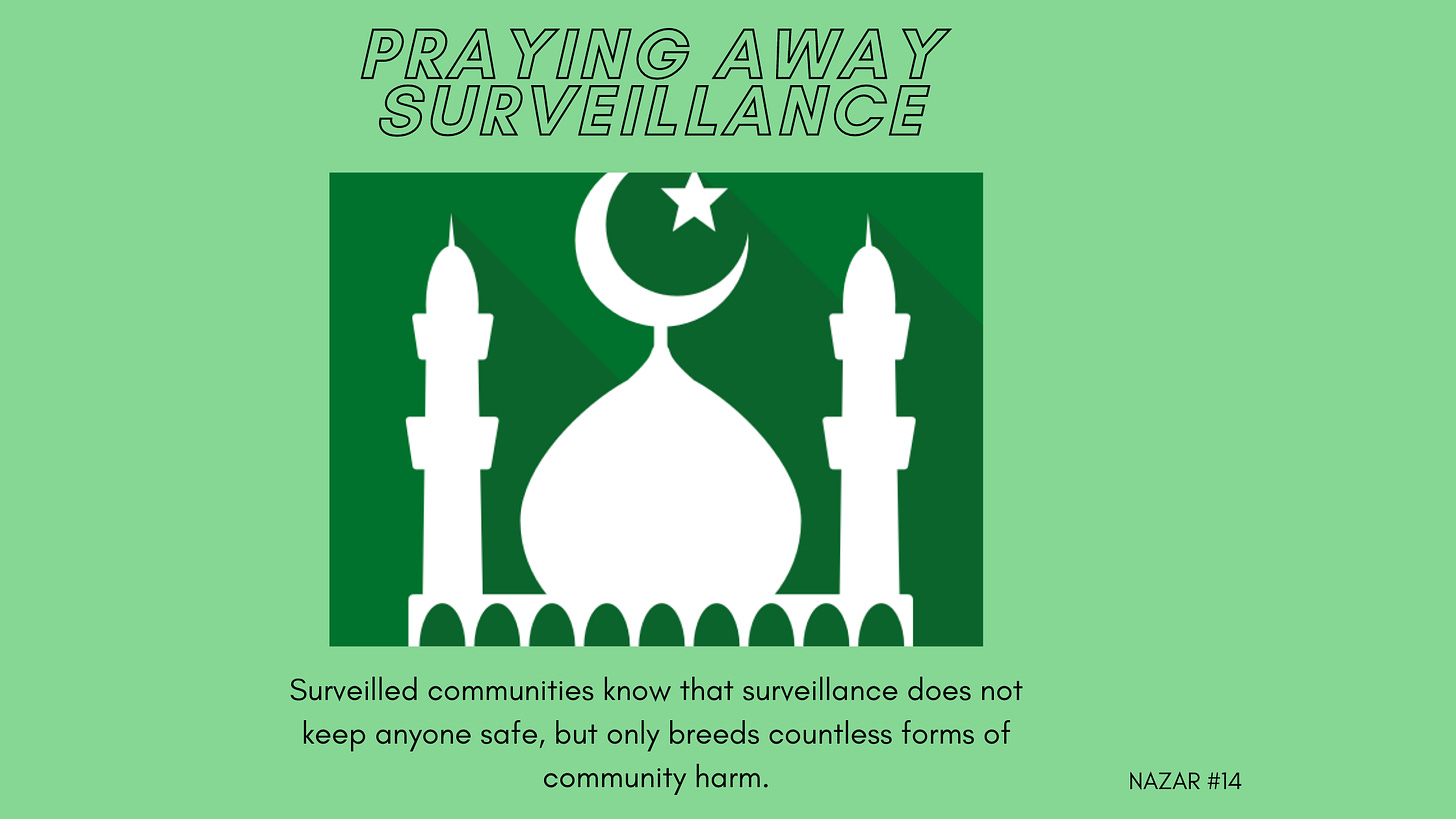(GUEST) Praying Away Surveillance: A Reflection on Muslim Pro
Surveilled communities know that surveillance does not keep anyone safe, but only breeds countless forms of community harm.
📝 Monthly Round-Up
Pursuing A People's Exegesis: An Islam Against Surveillance, Vanessa Taylor — I generally avoid putting past NAZAR issues in this round-up. But, I think this piece on developing anti-surveillance readings of Islam is important for people to revisit today.
The Feeling of Being Watched: Discussion Reflections, Yara Younis — You can learn more about this documentary in the organizing round-up below. I’ve also included the discussion guide. I encourage people to read Younis’ reflection alongside these other materials.
The Muslim Surveillance Industrial Complex, Waqas Mirza — A short article that does an excellent job unpacking how surveillance of Muslims continues beyond what people may see as the “traditional” / “usual” methods, like sending FBI agents to post up on your block.
On Monday, a Motherboard report on how the U.S. military obtains location data from apps named Muslim Pro as connected to this supply chain. In her op-ed, guest Sumaiya Zama reflects on this news.
My mom’s call to prayer is always blasting from her cellphone. In the checkout line at Target, in the background of a Zoom call, when we had non-Muslim friends over; she has never hit the side button on her phone for anyone or anything. I always thought this was my mom’s tiny revolution; a spark of resistance that lit like a flame inside of her. This was something she felt only she could control. Like it was her way of saying she was, unapologetically, unequivocally, and wholly here. Wholly Muslim.
Prayer apps like Muslim Pro are critically important for Muslims in the West like my mother. There is no public call to prayer and virtually no other way she can know precisely when to pray each day But earlier this week, Vice’s Motherboard broke a story about Muslim Pro selling the data of its 98 million users to third parties. Motherboard found that one of the companies Muslim Pro contracted with, X-Mode, would sell that information to other contractors and, by extent, the U.S. military. The data sold included geolocations, information about specific phones, and more.
After Motherboard’s report, Muslim Pro released a statement where their defense hinged on disingenuously claiming media reports accused the app of selling directly to the U.S. military. While Muslim Pro also claimed it has been “open and transparent” about the data it collects, Motherboard reported that Muslim Pro’s privacy policy never mentioned X-Mode, only Tutela and Quadrant, two separate data companies it worked with. In its statement, Muslim Pro said it has terminated its relationship with all data contractors.


Now, millions of Muslims have been left with lingering questions about what their information was used for. For example, in the case of Babel Street, a second company the U.S. military uses to obtain location data, Motherboard reported its Location X product was used to “support Special Operations Forces mission requirements overseas.” While details regarding X-Mode are slim, the company told Motherboard in an e-mail that its work with U.S. military contractors “is international and primarily focused on three use cases: counter-terrorism, cybersecurity and predicting future COVID-19 hotspots.”
However, the issue of how the data is used is not the beginning nor the end of what is wrong with surveilling Muslims. Over hundreds of years, surveillance of Muslim communities has taken many insidious forms. Since the arrival of the very first enslaved African Muslims on these lands, Muslims have been under watch, and the post 9/11 era has seen surveillance infrastructures strengthened and expanded through digital technologies. None of it is justified and all of it is done with the intent of dismantling and destabilizing Muslim communities both in the United States and overseas.
Surveilled communities know that surveillance does not keep anyone safe, but only breeds countless forms of community harm. We begin to question everything when we are surveilled, from our own reality and the safety of our friends and family, to our own humanity. Young Muslims are acutely aware that many of the resources and spaces tailored for our community are at best compromised spaces, and at worst, co-conspiring in the harm of the very people they claim to serve. This time, trust was broken not through the surveillance of young Muslims’ social media or by a spy in a Muslim space, but via an app that tells millions of Muslims around the world when to pray and which direction to pray in.
When I called my mom to delete Muslim Pro, I didn’t expect for my voice to break. Studying and organizing around surveillance is what I do. None of this is news to me and yet all of it has somehow broken a part of me. Hours later, through the memes and conversations with friends, I processed how and why I felt this way. My community work has always been spiritually grounded and theologically informed. In me, I was feeling the spiritual and emotional damage of surveillance.
Still, I have hope. Muslims have always found resourceful ways to worship alone and in community against all odds; from enslaved Muslims carving verses of the Qur’an secretly into to congregating in basement masjids and in the side rooms of churches. My childhood imam at my local masjid gave the call to prayer every single day until he was deported after our community was infiltrated with FBI informants. And once he was gone, that call for prayer was picked back up again by youth who had learned how to deliver it from him. Before the apps, there was the battery operated Masjid al Aqsa clock that someone’s aunty brought from Hajj with the most robotic sounding adhan ever. Before the clocks, there was the monthly print out from IslamicFinder on the fridge. And after Muslim Pro, there will be something else; another way to survive as a Muslim in the heart of the surveillance state.
Sumaiya Zama is an MA candidate for the Columbia and Aga Khan University dual degree in Islamic Studies and Muslim Cultures. Her interests include reading Islamic texts as liberation theology and learning from scholars in the field so that she may further develop its theory and praxis. Her academic interests are sparked by her background in youth work, civil rights, and community organizing, through which she explores how Muslim Americans, particularly young Muslim women, deploy the Islamic tradition to respond to life under a surveillance state.
📌 Organizing
Muslim Wellness Foundation — Throughout the pandemic, MWF has led incredibly important initiatives like the National Black Muslim COVID Coalition launched with Muslim ARC. In light of these reports, though, I want to uplift their resource for dealing with community trauma and their community screening healing guide for, well…
The Feeling of Being Watched — Normally, I try to link to free resources. However, Assia Boundaoui’s documentary on FBI surveillance of the Muslim community she grew up in outside of Chicago is fundamental viewing, and currently available to rent on Vimeo.
Equality Labs — Describing itself as “at the intersections of organizing, community based research, culture-shifting art, and internet freedom, for South Asian religious & cultural minorities”, this is a dope organization with a collection of digital security resources.




